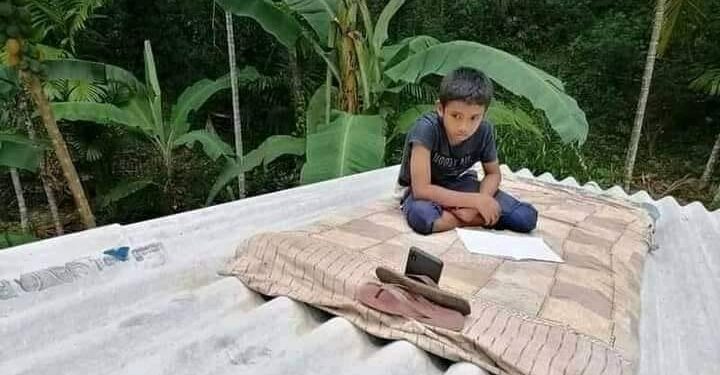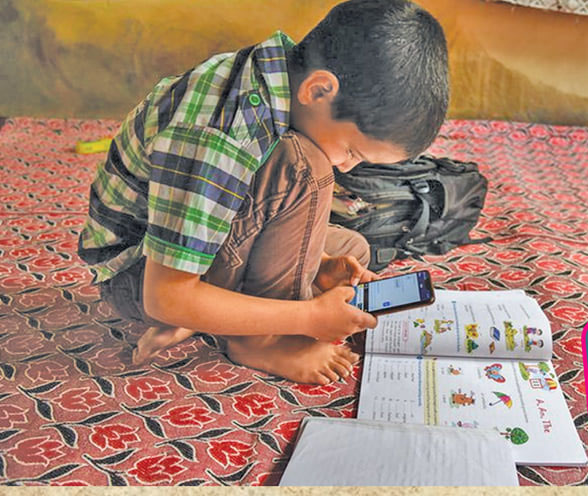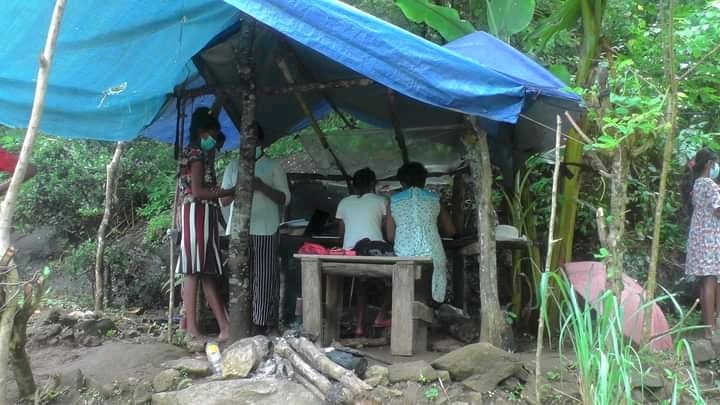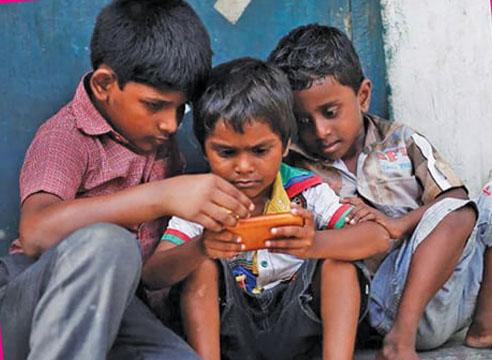On-line education poses enormous challenges to children in Lankan estates
Posted on July 6th, 2021
By Jeeva Sathasivam/www.journo.lk Courtesy NewsIn.Asia

Colombo, July 6: In these days of the pandemic, how would children in the plantations study when they have no money to buy cell phones to follow on-line lessons, and even if they have the phones, they have to climb rooftops or hilltops to access signals.
An upcountry mother says that it is difficult for the family to buy cell phones and data cards. Even when they have them, sometimes there is no signal coverage. Because of this, our children are unable to attend the daily online Zoom classes. Sometimes, about ten students of the same class get together and use one phone to learn the lessons. The situation is pathetic,” the mother said.
This situation didn’t erupt all of a sudden. The long historical background of the upcountry people is the cause. The purpose of this article is to study the present ‘hallenges encountered by the Up-country Educational Environment’ in its historical context and the current corona outbreak.

Free education
The very same year Sri Lanka became independent, the Up-country people were deprived of citizenship. This is the reason why they are lagging behind other communities.
Free education had been introduced in 1943 by C.W.W.Kannangara, also called the father of free education. But free education was available to the plantation estate schools only 40 years after other communities had enjoyed it. When Sri Lanka became a Republic in 1972, the government took over the schools run by estate management. But, this became effective only in 1980.
Accordingly, changes in the school syllabi, administrative circulars, appointments of principals and teachers and their salaries took place. However, no changes were made to the physical resources, like school buildings, playgrounds and infrastructure.
In 1990, when these necessities were felt, foreign voluntary organizations like GTZ (Germany) and SIDA (Sweden) came forward to help. At that time, the Plantation Schools Unit started functioning under the Central Ministry of Education.
The estate schools taken over by the government forty years ago. But the question now is what are the special arrangements already made or are being made by the government to convert them into proper government schools, since the projects undertaken by the foreign voluntary organizations have already been completed?
Nationwide, 843 schools are functioning in the estates. These estate schools are caught in the heart of the corona pandemic. These schools first closed during the 2020 lockdown, reopened in stages, adhering to health guidelines. While reopening these schools, big problems surfaced due to lack of infrastructure. The need for physical resources, beginning from water supply to wash hands, toilet facilities and their maintenance, spacious classrooms for social distancing, and so on were some of the issues. In a situation like this, how could they continue their education without anxiety? Parents are also reluctant to send their children to schools for fear of corona.
Further, by 2021 corona online education through Zoom classes began throwing new challenges before the up-country estate students. They had to adjust themselves to the e-learning trend. The questions are: They do not have safe electricity connections at home and schools. They have no computers or other devices like Android Mobile Phones, Tabs, iPads, or Laptops. If they do not, who would provide them?
Using smartphones, my classmates are attending online classes. I do not have such a phone. The related educational channel is not available on TV. This year I have to sit for the General Certificate of Education Examination. How can I write the examination?” asks a student. A Grade 8 student says: My classmates are studying with I phones. I do not have that facility. I do not know how to handle it. Though I am interested and wish to study online, unfortunately, I am unable to make use of this facility”.

A Grade 5 teacher is preparing her students for the Scholarship Examination and shares her experience on this matter. I am teaching 28 students sitting for the scholarship examination this year. Out of the 28, only 20 have joined the Zoom classes. Radio signals are interrupted very often. As a result, they experience many obstacles. When I ask them questions, unless their parents or siblings are by their side, they find it difficult to operate the microphones”.
The inability of students to reload data packages regularly, the fact that cell phones used by their parents lack the facilities are among obstacles faced by these students. If this situation continues, there will be a drop in the success rate of the students. When this situation is not 100% favorable even for the upper-grade students, what will be the position of lower grade students?
Networks and Coverage
In the estate sector, most schools are located in mountainous areas where mobile and broadband coverage is very poor. As a result, students develop a tendency to hate online education. A student in Grade 12 said: Online classes start at 6.00 am. Without proper coverage, lessons are interrupted. Even when we join the classes with interest, it is difficult to understand the lessons due to interruptions. When the teacher asks questions, we are unable to answer. I am frustrated. How can I sit for the examination next year?” Most of the up-country estate students are frustrated.”
In the upper-grade classes, Science and Maths subjects are taught rarely. Generally, these two subjects are taught in tuition classes. This is a source of income for teachers who conduct tuition classes after school. Separate classes are conducted on payment of fees.
During the previous Good Government” regime, laptops were provided to some school students and students studying in universities. It was opposed by the opposition at that time. However, devices were provided to a few schools. Some schools now have ‘smart classrooms’. We must also remember that many schools rejected this (for political reasons).
Views of Education Officers:
The participation of estate sector students in online education is as low as 50%, in comparison with students from other regions. This came to light in a recent statistical study conducted in an Education Zone of the Central Province. Due to the continuous lockdowns, the number of students attending online classes has declined.
Some students have access to cell phones, but they are not proficient in operating Zoom. Due to this, they are unable to attend Zoom classes, even when they have an interest in it.
In most houses, cell phones are the main mode of communication and the lack of sufficient knowledge to use them for educational purposes has caused frustration.
Teachers
Only certain teachers conduct online classes. Leaving aside their technical knowledge, they are unable to coordinate with their students in mountainous areas where coverage is low. As a result, there is a big gap between teachers and students.
It has to be mentioned here that in certain schools, self-learning programs were conducted for the teachers on Zoom.
About 50% of the students who could not join the online classes have given up studying in this method.
The Education Ministry took special action to introduce the government’s Gurugedera teaching programme through E.Thaksala, Eye Channel, and Kurunchi Radio. But it is not possible for the students who do not have TVs or cannot access the wavebands.
Solution
Telecom companies should introduce a new policy to provide free internet services to students. As of now, schools are functioning with Zoom technology via the internet. The students who cannot afford data, fail to attain their targets. Among them are talented students, who wish to progress but are now falling behind.

Students who can afford to spend on data are evaluated as the ones who can progress in studies now. Even though we live in the information age, it is distressing that we are unable to help our students, who are our next generation.
It is questionable as to whether the online learning system that started with the pandemic is equally available to every student. There is the possibility of a widening gap between the affluent and poor students. With these challenges before them, how can upcountry estate students move forward, toward a better future?
Many of those from this community who are now in better positions must contribute to uplifting the standard of education in this community that is lagging behind others. It may be in the form of advice, funds, donations, and service. It is essential that Old Boys Associations and Development Committees of Schools, wealthy community members, business people, learned persons in big positions, retired teachers, principals and academics coordinate and develop a common program to achieve this goal.
(The opinions expressed in this publication are those of the authors. They do not purport to reflect the Press Institute)